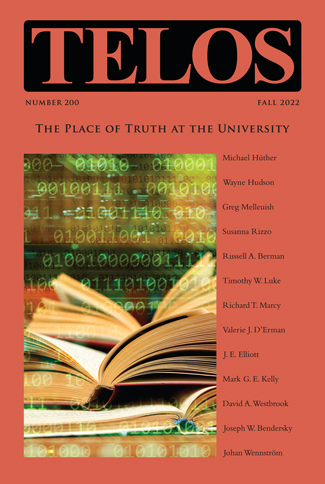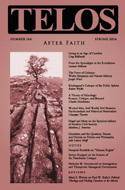 The fourth webinar in the Telos-Paul Piccone Institute’s yearlong series reckoning with the response to October 7 will take place on Sunday, April 7, 2024, at noon Eastern Time. The fourth webinar in the Telos-Paul Piccone Institute’s yearlong series reckoning with the response to October 7 will take place on Sunday, April 7, 2024, at noon Eastern Time.
Click here to register for the event.
All subsequent panels are likewise scheduled for noon Eastern Time on the seventh day of each month. Panels will run between 90 to 120 minutes, followed by a colloquy among the panelists and audience Q&A.
Our fourth webinar is titled “How to Teach in a (Culture) War: October 7, Antisemitism, and the Academy.” Our panelists are David Tse-Chien Pan, who will speak on “Diversity in Higher Education,” and Olga Kirschbaum-Shirazki, who will speak on “History and Theory, the Necessity of the Dialectic: The Case of Modern Jewish History.” Our respondent is John M. Ellis.
Continue reading →
By David Pan · Wednesday, November 2, 2022 After decades of contention, most observers agree that affirmative action in the form of racial preferences in college admissions will be declared unconstitutional by the U.S. Supreme Court. There are indeed few arguments left to support it. A supermajority of Americans opposes it, with 74 percent of Americans, including 58 percent of Blacks, indicating in the most recent Pew Research poll that race or ethnicity should not be a factor in college admissions. Racial preferences do not help the disadvantaged. As even a supporter of affirmative action writes: “Seventy-one percent of Harvard’s Black and Hispanic students come from wealthy backgrounds. A tiny fraction attended underperforming public high schools. First- and second-generation African immigrants, despite constituting only about 10 percent of the U.S. Black population, make up about 41 percent of all Black students in the Ivy League, and Black immigrants are wealthier and better educated than many native-born Black Americans.” As these statistics indicate, the racial categories do not correlate with disadvantaged status. They are even more problematic as a proxy for diversity. It is not clear why some markers of identity such as race and ethnicity should be considered significant for viewpoint diversity while others, such as religion, should not. Politically, university faculty have become much less diverse in terms of party affiliation over the last several decades of affirmative action policy, with a documented 11.5 to 1 ratio of Democrats to Republicans at leading universities in 2016. Moreover, because the defense of affirmative action has become a marker of anti-racism, the university support for the policy has suppressed opposing viewpoints by branding them as racist or sexist and not worthy of discussion, thus further reducing viewpoint diversity by encouraging pervasive self-censorship.
Continue reading →
By David Pan · Monday, October 3, 2022 Telos 200 (Fall 2022): The Place of Truth at the University is now available for purchase in our store. Individual subscriptions to Telos are also available in both print and online formats.
 The place of truth at the university has always been elsewhere. Scientific conclusions are after all hypotheses, subject to continuing examination and critique in a process that forever defers the arrival at a final truth. In addition to this unbridgeable temporal distance from truth, there is a spatial distance to the extent that the university is subject to a larger purposive context that stands outside of scientific activity itself. A researcher can be objective by being non-prejudicial in collecting facts and weighing arguments but can never be neutral in terms of the goals of the research, which must always be established before the research begins and from outside of the research project itself.[1] Research cannot begin until an interest in some question has been expressed, and such an interest has generally not been up to the researcher to decide. Whether the goal of medical research will be to protect humans from a virus or attack humans with a virus will be determined by the sponsor of the research rather than the researcher, who at best may decline to take part in some forms of research. If the determiners of the goals of the university are not the professors themselves but the society that sponsors their work, it is within this external values framework that the truth of the university must be found. The place of truth at the university has always been elsewhere. Scientific conclusions are after all hypotheses, subject to continuing examination and critique in a process that forever defers the arrival at a final truth. In addition to this unbridgeable temporal distance from truth, there is a spatial distance to the extent that the university is subject to a larger purposive context that stands outside of scientific activity itself. A researcher can be objective by being non-prejudicial in collecting facts and weighing arguments but can never be neutral in terms of the goals of the research, which must always be established before the research begins and from outside of the research project itself.[1] Research cannot begin until an interest in some question has been expressed, and such an interest has generally not been up to the researcher to decide. Whether the goal of medical research will be to protect humans from a virus or attack humans with a virus will be determined by the sponsor of the research rather than the researcher, who at best may decline to take part in some forms of research. If the determiners of the goals of the university are not the professors themselves but the society that sponsors their work, it is within this external values framework that the truth of the university must be found.
Continue reading →
By Nicholas W. Drummond · Thursday, May 1, 2014 Nicholas W. Drummond’s “Immigration and the Therapeutic Managerial Government” appears in Telos 166 (Spring 2014). Read the full version online at the Telos Online website, or purchase a print copy of the issue in our store.
 Multiculturalism as state policy in the Western World has functioned without serious complications because an unequivocal division existed between the oppressive culture group and the culture groups requiring protection. Recent evidence suggests this distinction may be fading and the consequences are likely to be significant. Managerial governments traditionally accommodating towards diverse cultures are beginning to critically evaluate immigrant communities feared to be afflicted with objectionable pathologies like the tendency of some Islamic groups to promote gender inequality, homophobia, and Sharia law. Multiculturalism as state policy in the Western World has functioned without serious complications because an unequivocal division existed between the oppressive culture group and the culture groups requiring protection. Recent evidence suggests this distinction may be fading and the consequences are likely to be significant. Managerial governments traditionally accommodating towards diverse cultures are beginning to critically evaluate immigrant communities feared to be afflicted with objectionable pathologies like the tendency of some Islamic groups to promote gender inequality, homophobia, and Sharia law.
Continue reading →
|
|
 The fourth webinar in the Telos-Paul Piccone Institute’s yearlong series reckoning with the response to October 7 will take place on Sunday, April 7, 2024, at noon Eastern Time.
The fourth webinar in the Telos-Paul Piccone Institute’s yearlong series reckoning with the response to October 7 will take place on Sunday, April 7, 2024, at noon Eastern Time.
 Multiculturalism as state policy in the Western World has functioned without serious complications because an unequivocal division existed between the oppressive culture group and the culture groups requiring protection. Recent evidence suggests this distinction may be fading and the consequences are likely to be significant. Managerial governments traditionally accommodating towards diverse cultures are beginning to critically evaluate immigrant communities feared to be afflicted with objectionable pathologies like the tendency of some Islamic groups to promote gender inequality, homophobia, and Sharia law.
Multiculturalism as state policy in the Western World has functioned without serious complications because an unequivocal division existed between the oppressive culture group and the culture groups requiring protection. Recent evidence suggests this distinction may be fading and the consequences are likely to be significant. Managerial governments traditionally accommodating towards diverse cultures are beginning to critically evaluate immigrant communities feared to be afflicted with objectionable pathologies like the tendency of some Islamic groups to promote gender inequality, homophobia, and Sharia law.

